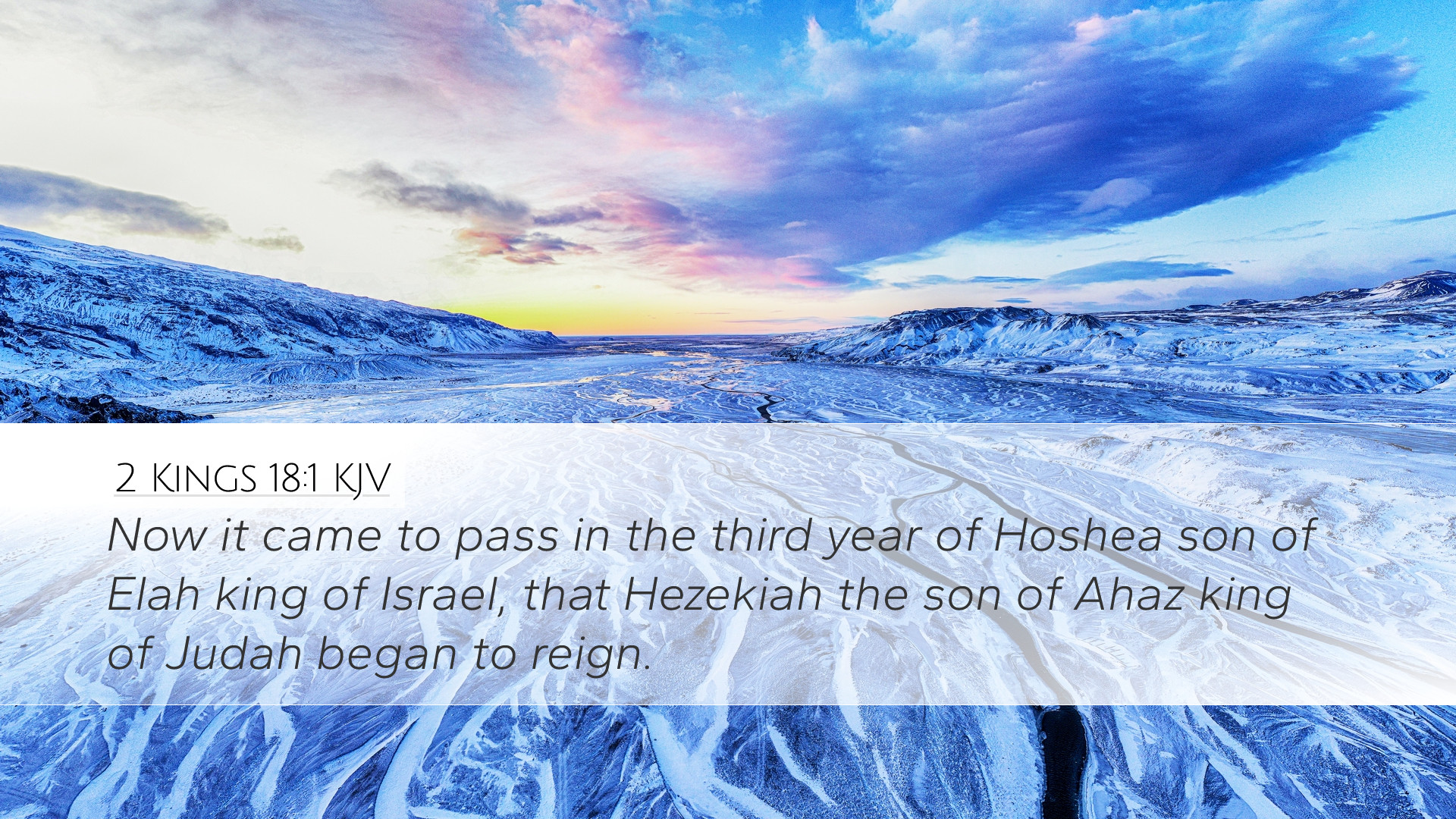Commentary on 2 Kings 18:1
Verse Reference: 2 Kings 18:1 - "Now it came to pass in the third year of Hoshea son of Elah king of Israel, that Hezekiah the son of Ahaz king of Judah began to reign."
Introduction
The reign of Hezekiah marks a significant period in the history of Judah. As a king, Hezekiah is often regarded among the greatest because of his earnest reforms and reliance on God. This verse establishes the timeline of his reign alongside the geopolitical landscape of the time, highlighting the interaction between Judah and Israel.
Historical Context
Hezekiah's ascension occurs in the context of Israel's decline and impending captivity. Hoshea, the last king of Israel, is on the throne, signifying the turmoil that precedes the fall of Samaria (2 Kings 17). This period is crucial as it sets the stage for the distinct paths taken by Israel and Judah.
Comparative Analysis
Matthew Henry emphasizes the significance of Hezekiah's lineage, being the son of Ahaz, a king characterized by idolatry and unfaithfulness. Despite this, Hezekiah rises to restore true worship in Judah. Men of low communal reputation can produce future leaders of righteousness, demonstrating that personal choices indeed transcend familial legacies.
Albert Barnes further notes the timeframe—Hezekiah began to reign in the third year of Hoshea. This synchronization not only places Judah's affairs within broader political events but also indicates a moment of divine intervention where leadership aligns with prophetic purposes. The narrative becomes richer when understanding how Hezekiah’s reforms contrast starkly with his predecessors, particularly in a polytheistic landscape.
Theological Insights
The mention of Hezekiah's reign signifies a transition toward a more theocentric governance. Adam Clarke points out the theological implications of Hezekiah's reign as it pertains to obedience and covenant faithfulness. His reforms are not merely political, but theologically driven, aimed at reviving the worship of Yahweh.
The Covenant and Idolatry
The historical backdrop of Hezekiah's reign is overshadowed by his father Ahaz's idolatry. Here, additional insights from Matthew Henry reveal that the fear of the Lord, as practiced by Hezekiah, positions Judah in a covenant faithfulness that resonates with the depredations from the north. Hezekiah's determination to remove high places and restore temple worship serves as a profound reminder of God's standards and expectations.
Hezekiah’s Character and Leadership
Hezekiah is remembered not just for his reforms but for his character as a leader. His reliance on God during crisis moments (notably during the Assyrian siege) sets an enduring example for leaders throughout history. Albert Barnes observes that Hezekiah's faith was tested, yet he demonstrated unfaltering trust in God's promises.
-
Faith: Hezekiah's faith led to national reforms (2 Kings 18:3) and reliance on God's deliverance (2 Kings 19).
-
Courage: Standing firm against Assyrian threats, insisting on fidelity to Yahweh amidst widespread fear (2 Kings 18:28-30).
-
Prayerfulness: His earnest prayers in times of distress exemplify a model for spiritual leadership (2 Kings 19:14-19).
Concluding Reflections
In analyzing 2 Kings 18:1, it is imperative to note the trajectory Hezekiah sets for Judah. His kingship represents hope amidst despair, underscoring the importance of godly leadership in turbulent times. Adam Clarke concludes with the thought that Hezekiah's reign is testimony that even a nation sullied by idolatry can find restoration through earnest repentance and a return to God.
As we reflect upon Hezekiah’s story, we are reminded that leadership grounded in faith, the rejection of idolatry, and a return to worship holds timeless significance for both ancient Israel and contemporary communities of faith.


